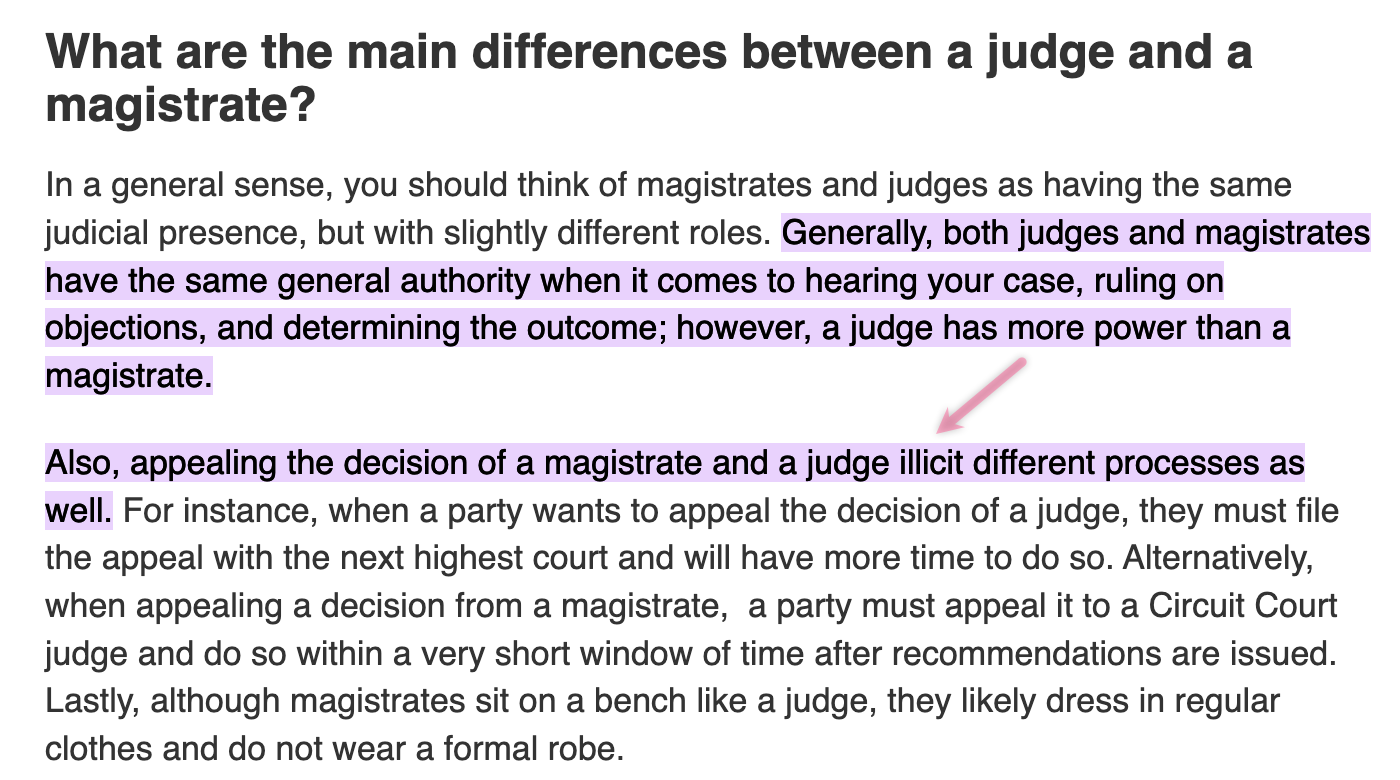Elicit → illicit
« previous post | next post »
Ruth Blau sent a link to a law firm's page on the "Difference Between Judges and Magistrates", which was probably created in response to the role of a magistrate in the recent FBI search of Donald Trump's Mar-a-Lago estate.
The linguistically relevant bit is the substitution of "illicit" for "elicit":
As usual, it's not clear why or how this happened. It's possible but unlikely that the author was confused about how to spell "elicit"; it can't just be a typing swap of "i" for "e", since the following "l" also needs to be doubled; no doubt there was some priming involved, since "illicit" is reliably front of mind for lawyers.

David Morris said,
August 19, 2022 @ 6:50 pm
I checked Google Ngrams. I was expecting to find that elicit was far less common, but they are both almost exactly as common. In natural speech, these are probably homophones for me, but in careful speech I would probably differentiate.
I once read the opposite, something like 'Their love was elicit'.
Max Wheeler said,
August 20, 2022 @ 3:18 am
"Elicit" and "illicit" are homophones for me, and probably most speakers of British English.
maidhc said,
August 20, 2022 @ 3:33 am
I think illict is a much more common word that elict, so more likely to intrude.
maidhc said,
August 20, 2022 @ 3:38 am
David Morris: You checked and I didn't. But I'm a little dubious about the result. Does it vary over time? elicit seems like a very old-fashioned word to me.
Victor Mair said,
August 20, 2022 @ 8:26 am
@Max Wheeler
"Elicit" and "illicit" are definitely not homophones for this speaker of American English.
J.W. Brewer said,
August 20, 2022 @ 8:40 am
I agree that "elicit" was likely the word intended but I still find it puzzling because "elicit" doesn't seem like a particularly sensible or idiomatic verb in the specific context of the sentence. It's as if the writer had been reaching for a high-falutin' synonym for "involve" or "require" but didn't quite read the thesaurus (or the mental-lexicon equivalent) correctly.
Separately, while the Mar-a-Lago situation may have created heightened public interest in understanding the role of federal Magistrate Judges in reviewing warrant applications, this piece is about the respective roles of magistrates and judges in the subsection of the Maryland state court system that deals with family-law (divorce, child custody, etc.) issues, which is not a particularly close analogy.
Stephen Hart said,
August 20, 2022 @ 9:28 am
J.W. Brewer said,
"It's as if the writer had been reaching for a high-falutin' synonym for "involve" or "require" but didn't quite read the thesaurus (or the mental-lexicon equivalent) correctly."
In this case, it's a law firm document, so high-falutin' may be required.
I find that reaching for a high-falutin' synonym is common in general writing, and often results in errors.
David Morris said,
August 21, 2022 @ 6:40 am
@maidhc: Usage of illicit and elicit has risen and fallen over the years, but remained approximately equal.
Another thing I found is that unlawful had previously been more common than illicit, but has fallen sharply since 2000. In my job as a legal editor, I often encounter 'unlawful non-citizen'.
David Morris said,
August 21, 2022 @ 7:13 am
PS I know that Google Ngrams has its limitations, but I don't have access to more authoritative sources.
David Morris said,
August 25, 2022 @ 7:47 am
Slightly related: today I read about someone's "illusive suitcase".